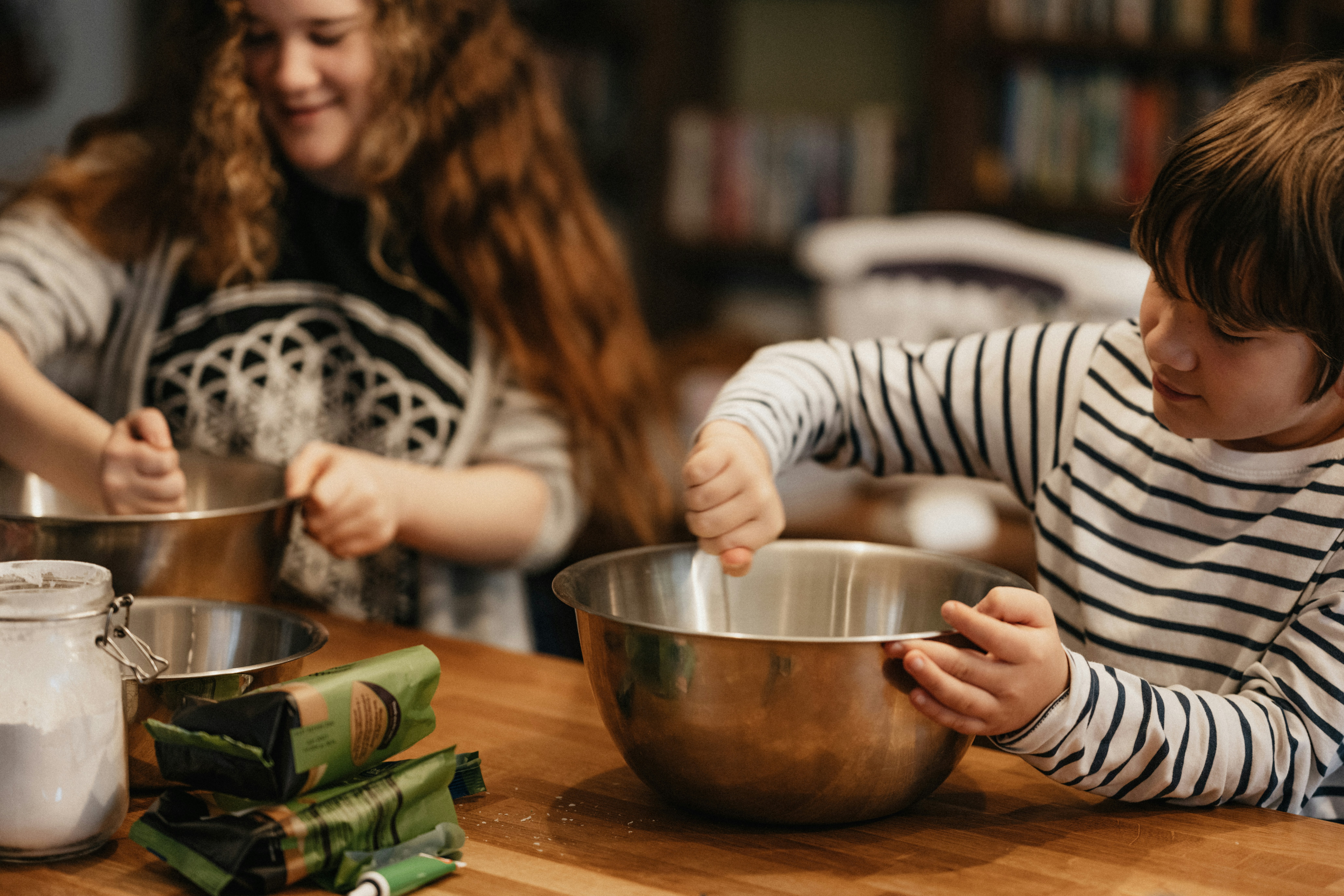
Discover the Benefits of Cooking as a Learning Process for Kids
Parents and educators, have you ever experimented with the kitchen as a classroom? Cooking is fun and more—it’s a do-it-yourself learning process with invaluable life lessons baked into the process. From homeschooling or looking for ways to reach kids in new ways, cooking is perhaps the ultimate way to activate creativity, bring real-life lessons to the table, and establish a love for learning.
Read on to learn the startling benefits of having children in the kitchen and how it impacts their cognitive, emotional, and social development—and transforms nightly dinner prep into a magical family activity.
Cooking builds essential life skills
The most obvious and immediate benefit of cooking with children is teaching them skills that they will utilize throughout their lives. Through the process of learning to prepare, plan, and cook a meal, children develop an increased understanding of nutrition, time management, and responsibility.
The following is a brief table that provides some of the life skills that children can gain through cooking activity.
| Life Skill | How Cooking Contributes |
| Time management | Cooking involves setting timers, managing tasks, and juggling responsibilities. |
| Teamwork | When cooking with others, kids learn to collaborate and divide tasks. |
| Independence | Kids gain confidence as they master new recipes on their own. |
As children learn to care for themselves through cooking, they become independent and considerate of their own health. And let’s be honest, who wouldn’t be proud to have made their own pancake from scratch?
Math and science lessons come alive
Cooking is all about interactive, hands-on mathematical and scientific lessons! Reading out ingredients, operating with ratios, and measuring cooking times translate abstract ideas into real-world experiences. Instead of fighting to understand fractions in a text book, your child will be able to see just how “1/2 cup” and “2/3 cup” are different as they work through baking measurements.
On the scientific side, kitchen experiments—whether watching bread dough rise or seeing the impact of heat on raw eggs becoming scrambled eggs—deconstruct difficult topics like chemical reactions and states of matter into easy understanding.
Consider this boiling water scenario:
- Room-temperature water is a liquid.
- Add heat, and the water is 100°C and steam (gas).
- This transformation displays phase changes—a favorite science topic students learn about at school.
Who would have imagined that your saucepan can be a laboratory?
Encourages problem-solving and creativity
In contrast to most homework, cooking is both framework and open-ended. Recipes provide a structure, but there remains ample opportunity for creativity. Children can substitute chocolate chips for raisins or customize the recipe to their desires. By trial and error and failure, they learn problem-solving strategies and how failure can lead to inconceivable successes (or guffawing learning experiences).
Cooking challenges, such as preparing healthy school snacks or preparing a themed meal, challenge children to think creatively within some boundaries. These little but significant choices build confidence and promote independent thinking.
Quality time with emotional rewards
A shared cooking experience is also a bonding time. Parents can bond one-on-one with their children while sharing family traditions and recipes. Grandparents, for instance, can share their secret sauce recipes while making invaluable memories in the process.
Cooking also provides emotional rewards, like patience and present-mindedness. Merely kneading dough or frosting cupcakes causes children to slow down and be in the moment. It shows them the worth of patience as they have to wait for their cookies to bake or dough to rise—valuable lessons in today’s hastened, instant-reward society.
Social skills and communication
Observe how individuals are always brought together by food. Team cooking entails collaboration and communication. Have you ever assigned a task to brothers and sisters to prepare a mid-morning snack, and how would they be doing that?
Here is a quick table that will exhibit cooking’s contribution towards social gains.
| Social Skill | Cooking’s Contribution |
| Communication | Assigning tasks, asking for help, and explaining steps encourage verbal skills. |
| Empathy | Kids learn to consider others’ dietary preferences and restrictions. |
| Conflict resolution | Resolving disagreements, like who gets to mix the batter, is part of the process. |
Even cooking can result in cultural awareness through the exploration of foods from throughout the globe. Your kids can prepare sushi one day, paella another day, and finish the week off with classic Italian pizza—making your kitchen a gateway to the world.
Healthy habits, happy kids
One of the secret advantages of cooking with children is its impact on eating habits. Getting involved in cooking makes kids eager to try the food they’ve put their time and energy into. This works especially well for picky eaters.
By exposing children to new, whole foods and demonstrating how food is prepared, you instill a sense of creativity and curiosity about healthy eating. They’re more apt to reach for fruit kabobs or yogurt parfaits if they’ve had fun making them themselves.
In addition, having your children join you in the grocery shopping and cooking process instills a feeling of responsibility on their part. Now, “I don’t like vegetables” becomes “Look at the rainbow salad I cooked!”
How to begin cooking as a learning experience
If you’re wondering how to start cooking with your kids (without turning your kitchen into chaos), here are a few tips to make the experience fun and rewarding for everyone.
- Start small and simple. Choose easy recipes such as sandwiches, smoothies, or pasta.
- Assign age-appropriate tasks. Little ones can wash veggies or mix ingredients, while older kids can handle measuring and chopping (with supervision).
- Celebrate the process. Highlight less perfection and more learning, testing, and enjoying.
- Create safety procedures. Teach children to take precautions when approaching hot surfaces and sharp tools.
For more kid-friendly
recipes, go to credible sources like AllRecipes‘ Family Favorites or BBC Good Food’s Cooking with Kids page.
Make mealtime meaningful
Cooking is not food—it’s growth, creativity, connection, and life skills. By engaging kids in the kitchen, you’re opening doors to bonding, learning, and making memories that last a lifetime. And, you’re equipping them with the skills they’ll need to succeed both in and out of school.
Are you ready to make a learning and fun environment in your kitchen? Grab a kid-friendly recipe, roll up your sleeves, and get cooking with them!


